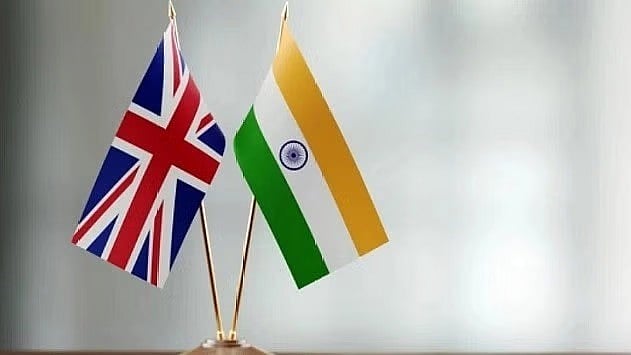
India and UK flags. For representational purposes.
Credit: iStock Photo
New Delhi: The free trade agreement (FTA) with the UK is likely to benefit India’s labour-intensive sectors like textiles, marine products, leather, footwear, sports goods and toys, gems and jewellery, engineering, and also various services sectors like IT and professional services even though there is no commitment on immigration policy and carbon tax.
According to the Apparel Export Promotion Council (AEPC), ready-made garment export from India to the UK is likely to double in the next three years. “This deal has come as a boon removing tariff disadvantage of 9.6% and making us competitive in the UK market,” said AEPC Chairman Sudhir Sekhri.
As a part of the developing countries trading scheme, Bangladesh, which is India’s major competitor in the ready-made garment sector, enjoys duty-free access to the UK market. After the signing of the deal India will also get duty-free access.
PMs of India and the UK announced the conclusion of the FTA deal on Tuesday. However, the date of signing the deal is yet to be announced.
SBI Research said India will benefit from the UK’s FTA commitments in service sectors such as IT/ ITeS, financial and educational services.
“The agreement creates new export possibilities for sectors requiring a substantial workforce, including textiles, marine products, leather, footwear, sports goods, gems and jewellery, engineering goods, auto parts and engines, and organic chemicals,” it said.
SBI Research said in a note that India will benefit from the UK's FTA commitments in various service sectors, including IT/ ITeS, financial, professional and educational services.
"The agreement creates new export possibilities for sectors requiring a substantial workforce, including textiles, marine products, leather, footwear, sports goods and toys, gems and jewellery, engineering goods, auto parts and engines, and organic chemicals," it said.
"It is clear that mass IT services have to be provided by India, as the UK does not have that kind of manpower. They are also competing with the US as a technology innovation hub. So, the UK and India are looking at a collaborative hub of innovation,” explained Vikas Gupta, CEO and Chief Investment Strategist, OmniScience Capital.
EEPC India Chairman Pankaj Chadha claimed that India’s engineering exports to the UK would double in the next five years. The UK is currently India's sixth largest engineering export destination. The total engineering exports to the UK stood at $4.01 billion in 2024-25.
The trade deal is unlikely to have any special commitment on two contentious issues — immigration and the proposed carbon tax. However, the UK has agreed to give up to 1,800 visas for Indian chefs, musicians and yogis a year. On the proposed carbon tax the talks will continue.
On the other hand, India has not agreed to give any duty concessions to British businesses on a number of sensitive industrial goods like diamond, silver, smartphones and optical fibers. Also, the duty concession on imports of petrol and diesel engine vehicles from the UK will be limited to pre-defined quotas.
India’s former ambassador to the World Trade Organization (WTO) Jayant Dasgupta said the deal with the UK would be a stepping stone for a similar agreement with the European Union.
However, sectors such as luxury auto and medical devices could be disadvantaged with domestic brands facing competition from international ones at reduced rates, cautioned Vinit Bolinjkar, Head of Research, Ventura.